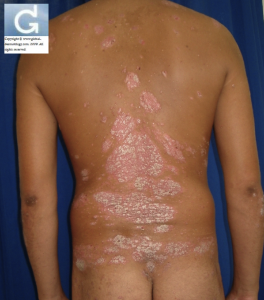Psoriasis
Dr Christophe Hsu – dermatologist. Geneva, Switzerland
What is psoriasis ?
- It is an inflammatory skin condition.
- An infiltrate of cells involved in inflammation attract other participants to perpetuate the inflammatory process.
What are the chances of having it ?
- The proportion of the population having psoriasis is 2%. This percentage is higher regionally, particularly in Northern Europe.
- The condition can present at any age, but to age peaks can be identified: the first one between 20 and 30 years old, and the second between 50 and 60.
What does it look like ?
- Many subtypes have been described according to the presentation (plaque psoriasis, pustular psoriasis, guttate psoriasis) and location (scalp psoriasis, nail psoriasis, inverse psoriasis). Lesions can also be localized on previously traumatized areas (Koebner phenomenon (Kobner, Köbner).
- The most common subtype is plaque psoriasis. The lesions consists of plaques which are red at the base and thick and scaly on the surface (silvery scale). These lesions are localized on the knees, buttocks, elbows, scalp. Lesions are also found on the nails (rough looking, oil spot, ungeal depressions) and in the oral cavity (geographical tongue). Rubbing the lesions on the surface is like rubbing a candle with the “wax” being the scale;rubbing deeper induces bleeding (Auspitz sign).
- Psoriasis is defined as a non-itchy skin condition. However, up to one third of patients complain of scratching.
Why do I have psoriasis ?
- The increased cell turnover which is found in psoriasis is caused by a combination of genetic AND environmental factors.
- Genetic factors: It is commonly accepted that heredity plays a role and different genetic profiles have been identified. This genetic link can be put into evidence in real twins (monozygotic): if one is affected, the other one will have psoriasis in 70% of the time. However, the absence of a 100% correlation suggests that the genetic link is itself not sufficient to explain why psoriasis develops.
- Environmental factors: some factors have been identified but in most cases, these remain a mystery. Psoriasis can be induced by oral drugs such as lithium, beta-blocking antihypertensives, antimalarials…Stress is assocoated with development or worsening of psoriasis. Additionally, a subtype of psoriasis called guttate psoriasis is sometimes caused by a bacterial infection (Streptococcus).
Can it be cured ?
- The lesions can improve and sometimes even disappear with treatment but the psoriasis disease remains and the lesions can reappear spontaneously if treatment is stopped.
- Guttate psoriasis can sometimes be cured following treatment with antibiotics.
How is it treated ?
- Before treating psoriasis, it is important to determine what result you will be happy with. Some are happy when the embarrassing fall of the thick scales stops whereas some want complete clearance:
- creams/ointments include: moisturizers, coal tar, steroids (corticosteroids), derivatives of vitamin D).
- light treatment (phototherapy), PUVA, UVB.
- oral treatment: derivatives of vitamin A, ciclosporine, methotrexate…
- treatment by injections: biologics
Contributors:
Dr Christophe HSU – dermatologist. Geneva, Switzerland
Category : cause du psoriasis - Modifie le 07.10.2010Category : cause of psoriasis - Modifie le 07.10.2010Category : fréquence du psoriasis - Modifie le 07.10.2010Category : frequency of psoriasis - Modifie le 07.10.2010Category : psoriasis - Modifie le 07.10.2010Category : traitement du psoriasis - Modifie le 07.10.2010Category : treatment of psoriasis - Modifie le 07.10.2010



